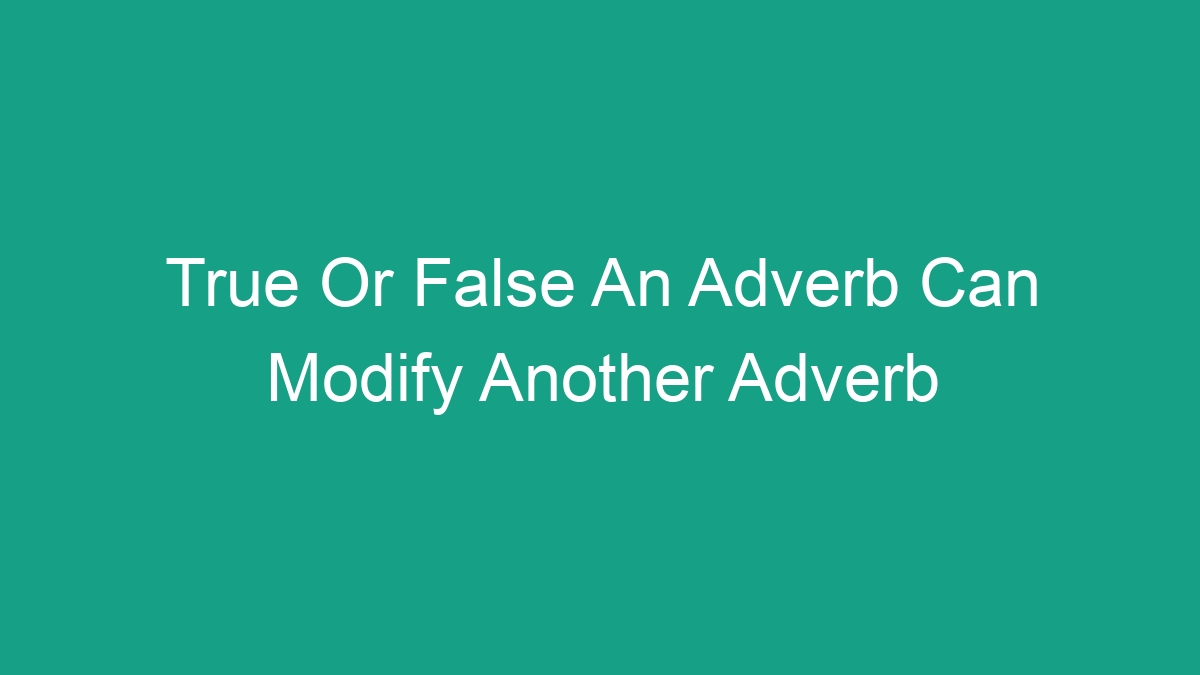
Introduction
When it comes to understanding the English language, grammar rules can often be confusing. One common question that arises is whether an adverb can modify another adverb. In this article, we will explore this topic in depth, providing a comprehensive analysis of the rules surrounding adverbs and how they can interact with each other.
What is an Adverb?
Before delving into the main question, it’s important to first understand what an adverb is. An adverb is a word that modifies a verb, adjective, or another adverb. It provides information about how, when, where, or to what extent an action is performed. Adverbs often end in “-ly,” but there are many adverbs that do not follow this pattern.
Can an Adverb Modify Another Adverb?
The simple answer to this question is yes. An adverb can indeed modify another adverb. This is a common occurrence in the English language, and it is perfectly acceptable grammar.
Examples of Adverbs Modifying Adverbs
To further illustrate this concept, let’s look at some examples:
- She sang incredibly beautifully. In this sentence, the adverb “incredibly” is modifying the adverb “beautifully.”
- He ran very quickly. Here, the adverb “very” is modifying the adverb “quickly.”
- The team played surprisingly well. In this case, “surprisingly” is modifying the adverb “well.”
These examples demonstrate how adverbs can modify other adverbs within a sentence, providing additional information about the manner in which an action is performed.
The Role of Adverbs in a Sentence
Adverbs play a crucial role in providing detailed information about verbs, adjectives, and other adverbs. They help to clarify the circumstances or manner in which an action is carried out, adding depth and nuance to the overall meaning of a sentence.
The Placement of Adverbs
In English, adverbs can be placed in different positions within a sentence. They can come before the verb, after the verb, or at the beginning or end of a sentence. When an adverb is used to modify another adverb, it is typically placed before the adverb it is modifying.
Commonly Confused Words: Adverbs and Adjectives
It’s important to note that adverbs and adjectives are often confused, as they both serve similar functions in modifying other words. However, there is a key difference between the two. Adverbs modify verbs, adjectives, and other adverbs, while adjectives modify nouns or pronouns.
When to Use Adverbs to Modify Adverbs
When deciding whether to use an adverb to modify another adverb in a sentence, it’s important to consider the specific context and the level of detail you want to convey. Adverbs can enhance the meaning of a sentence by providing additional information about the manner or intensity of an action.
Conclusion
In conclusion, the statement “an adverb can modify another adverb” is true. Adverbs play a versatile role in the English language, providing crucial details about the manner in which actions are performed. By understanding the rules surrounding adverbs and how they can interact with each other, writers and speakers can effectively convey their intended meaning with clarity and precision.
FAQs
Can an adverb modify an adjective?
Yes, adverbs can modify adjectives. They provide further information about the extent or manner of the quality described by the adjective. For example, in the sentence “The movie was extremely entertaining,” the adverb “extremely” modifies the adjective “entertaining.”
What is the difference between an adverb and an adjective?
Adverbs modify verbs, adjectives, and other adverbs, providing information about how, when, where, or to what extent an action is performed. Adjectives, on the other hand, modify nouns or pronouns, describing the qualities of the noun they modify.
Can adverbs be used to modify entire sentences?
Yes, adverbs can be used to modify entire sentences, expressing the writer or speaker’s attitude towards the statement. For example, in the sentence “Interestingly, he decided to pursue a career in acting,” the adverb “interestingly” modifies the entire sentence.
By understanding the rules and nuances of adverbs, writers and speakers can effectively communicate their ideas with precision and clarity.




